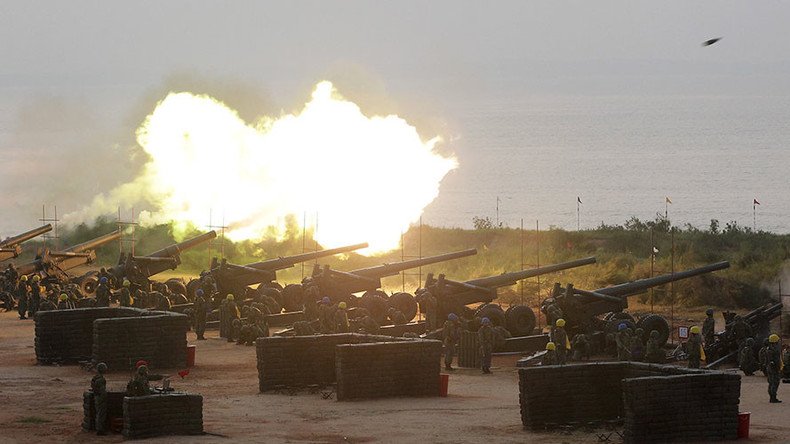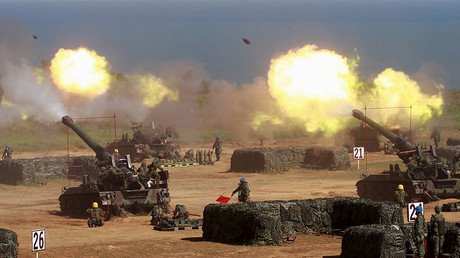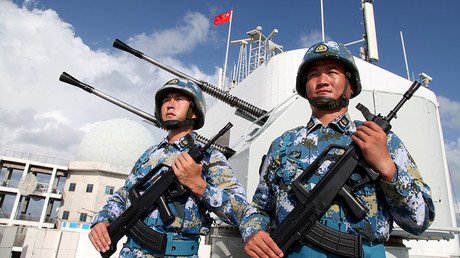Taiwan kicks off military drills aimed at fending off potential Chinese attacks - report

Taiwan has launched live fire drills as part of exercises it holds annually to prepare its military to defend against potential attacks from mainland China, according to Taiwanese Defense Ministry officials. The 33rd Han Kuang drills will take place over five days.
All branches of Taiwan’s military will be involved in the drills, which will include warplanes, the P-3C anti-submarine craft, the Mirage 2000, and F16 fighter jets, according to the South China Morning Post.
The drills kicked off with the warplanes leaving their respective airbases west of the island to stage emergency evacuations of airbases in the east, including those in Hualien and Chiashan.
The drills are conducted as preparation for possible strikes from the People’s Liberation Army (PLA) of China, according to Defense Ministry officials cited by the newspaper.
“[Monday’s] drill, involving dozens of war planes, was meant to preserve the combat power of our warplanes in the face of missile attacks by the enemies of our airbases in western part of Taiwan,” an official said.
A special army unit featuring the AH-64E Apache attack helicopter, which is capable of refueling and arming itself in flight, practiced landings and take-offs.
The live fire phase of the drills, which are to take place on Thursday, will showcase Taiwan’s elite forces from the army, air force, and navy fighting against “enemies” on Taiwan’s outlying island of Penghu. The drill will simulate a scenario in which Taiwan is facing an amphibious attack from the PLA, according to the official.
Taiwanese marines playing the role of the PLA will use amphibious assault ships and landing crafts to launch a simulated attack, while the army’s Apache helicopters, M60A3 tanks, and Thunderbolt-2000 rocket artillery will be deployed to repel the “enemies.”
The island’s president, Tsai Ing-wen, is expected to observe the drills in Penghu on Thursday.
On Friday, a simulated blitzkrieg attack will be staged against Chingchuankang airbase, Taiwan’s key central base.
The drills are the second part of the two-installment drills. The first phase, consisting of computer-simulated war games, took place May 1-5.
Those exercises were observed by a US team led by retired generals who gave Taiwan relevant recommendations, according to a military source cited by the South China Morning Post.
Meanwhile, Taiwan’s coastguard is holding a series of drills on Taiping Island in the disputed South China Sea from Wednesday to Friday. The island, also known as Itu Aba, is controlled by Taiwan, but is also claimed by China, Vietnam, and the Philippines.
Beijing has persisted in considering Taiwan to be part of ‘one China’ since the island politically split from the mainland amid a civil war in 1949. China regards the self-governing island a renegade province that must be cajoled into reuniting, by force if necessary.
Meanwhile, Beijing has been suspicious since Tsai was elected in January of 2016 that the island’s new president wants to push for formal recognition of Taiwan’s independence.
China cut off contact with Taiwan in June of 2016, over Tsai’s refusal to endorse the ‘one China’ policy, also known as the ‘92 consensus’. Beijing says it cannot resume normal relations with Taipei until the Taiwanese president endorses the policy.
Both Tsai and US President Donald Trump infuriated Beijing back in December, when Tsai called the White House to congratulate the American leader on winning the election.
In the wake of the call, Chinese state media warned Trump in January that the Chinese people would demand that Beijing “take revenge” if Trump backed out of the one China policy. Trump later endorsed the policy during his first visit with Chinese President Xi Jinping in February.
Seemingly unphased by China’s reaction to her call to Trump, however, Tsai has not ruled out phoning him again.
“We don’t exclude the opportunity to call President Trump himself, but it depends on the needs of the situation and the US government’s consideration of regional affairs,” she told Reuters last month.














